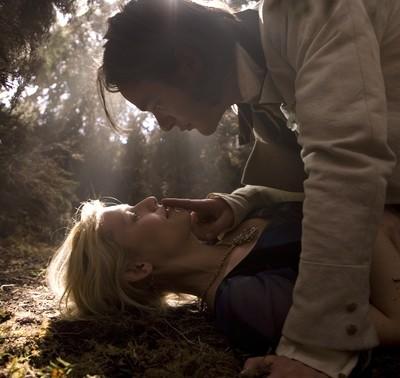‘Stardust’

It’s a formula for enchantment:
"Fencing, fighting, torture, revenge, giants, monsters, chases, escapes, true love, miracles …"
Enchanting indeed — in "The Princess Bride," from whence that description comes.
Alas, it proves somewhat less than enchanting in "Stardust," an adaptation of Neil Gaiman’s fractured fairy tale.
It’s not for lack of trying, however.
If anything, this potentially entrancing storybook adventure tries too hard, piling on the special effects and in-your-face comedy.
As a result, there’s little room for the flights of pure fancy "Stardust" promises but only sporadically delivers.
Perhaps the problem begins with director Matthew Vaughn, whose 2004 directorial debut, the neo-noirish "Layer Cake," boasted style-over-substance sizzle. (The steak was in future 007 Daniel Craig’s cool, caustic performance.)
Or maybe it’s co-writer Jane Goldman, who makes the jump from British TV without realizing that the kind of cheeky humor that works on the small screen sometimes proves too much when blown up to big-screen size.
Or maybe it’s just that, in a movie all about magic, the magic shouldn’t seem so maddeningly elusive.
"Stardust" takes us, once upon a time, to the fabled realm of Stormhold, where a star has just fallen to Earth in the fetching form of Yvain (Claire Danes), whose ethereal radiance proves an irresistible enticement to witches, princes — and princes among men.
Representing the latter: lovelorn Tristan Thorn (Charlie Cox), a humble shop clerk so besotted with the town beauty (Sienna Miller, who played Cox’s sister in "Casanova") that he volunteers to perform any impossible quest to win her hand — including her chosen challenge, retrieving a fallen star.
Charlie’s far from the only one interested in said star, however.
With Stormhold’s decrepit king (that impeccable thespian Peter O’Toole) on his deathbed, the survivors among his scheming sons (including Rupert Everett and Jason Flemyng) are on the star’s trail in a deadly battle to claim the throne, as their previously deceased brothers on hand to comment on their progress — or, more precisely, lack thereof. (These ghostly gents resemble a Greek chorus — as performed by the "Grim Grinning Ghosts" who hold court inside Disneyland’s Haunted Mansion.)
And where there are brothers, there must be sisters: three, specifically, led by the witchy, bitchy Lamia (Michelle Pfeiffer), who’s eager to obtain the star’s heart so she and her almost-as-evil sisters can guarantee themselves youth and beauty for eternity.
Fortunately for Yvain, Tristan finds her first. Not so fortunately, everyone else stays on their trail, leading to an epic chase — and a parade of fantastical friends and foes.
Among them: the notorious pirate, Captain Shakespeare (Robert De Niro) by name, whose menacing exterior masks secret song-and-dance talents — and a sartorial style flouncy enough to make "Pirates of the Caribbean’s" Capt. Jack Sparrow look like an "Ultimate Fighter" contestant.
Amusing it may be to watch De Niro cavort and caper about, but it’s his presence as an actor gleefully sending up his own intimidating image — not Captain Shakespeare’s presence as a character — that triggers the audience’s amusement.
That, in turn, offers a vital clue to "Stardust’s" hit-or-miss charm, which misses more often than it hits. (That goes double for Ilan Eshkeri’s thuddingly obvious, cue-with-every-cue musical score.)
With three major story lines — Tristan and Yvain, Lumia and the pursuing princes — in play, Vaughn sometimes struggles to juggle multiple plot points.
Maybe if he weren’t trying so hard to cram in so many elaborate computer-generated effects, which often seem more mechanical than magical, he’d have more screen time to develop the characters — and leave the conjuring to the actors.
Not that all of them would be up to the task.
The coltish, contemporary Danes emerges as an offbeat, only partially convincing choice as the ethereal yet insouciant Yvain, while Cox’s Tristan blends gauche charm with disarming dash.
As usual, however, the young protagonists emerge as the least interesting characters — especially with Pfeiffer on hand to stir the cauldron as lethal Lamia, a character even nastier than the crabby Baltimore stage mother/station manager she plays in "Hairspray."
Whether playing a vision of deceptive loveliness or Lumia’s (literally) rotten self, Pfeiffer is the one performer who seems more than capable of "Stardust’s" balancing act. She’s able to find, and play, the comedy within the fantasy — but without resorting to cartoonish excess. Lumia may be droll, but it’s only because she’s so deadly serious.
Unlike "Stardust" as a whole, which tries to be clever and jokey and bewitching all at once — without understanding that bringing such illusions to life can be an elusive proposition indeed.
CAROL CLINGMORE COLUMNSVIDEO
watch movie trailer
movie: "Stardust" running time: 125 minutes rating: PG-13; fantasy violence, risqué humor verdict: C now playing: Cannery, Cinedome, Green Valley, Neonopolis, Orleans, Palms, Rainbow, Red Rock, Sam’s Town, Santa Fe, Showcase, South Point, Sunset, Texas, Tropicana, Village Square DEJA VIEW Fractured or otherwise, these cinematic fantasies cast an undeniable spell: "Time Bandits" (1981) — Escorted by six dwarves, a time-tripping schoolboy meets King Agamemnon (Sean Connery), Robin Hood (John Cleese) and Napoleon (Ian Holm) in Terry Gilliam’s fantasy. "Labyrinth" (1986) — "Alice in Wonderland" meets "The Muppets" as a teen (Jennifer Connolly) battles a goblin king (David Bowie) to save her kidnapped baby brother. "The Princess Bride" (1987) — Robin Wright, Cary Elwes, Mandy Patinkin and Christopher Guest (among others) find amazing adventures in an enchanting adaptation of William Goldman’s tale. "Shrek" (2001) — The cranky title ogre (voiced by Mike Myers) teams up with a motormouth donkey (voiced by Eddie Murphy) to rescue a princess (Cameron Diaz) in this animated storybook spoof. "Pan’s Labyrinth"(2006) — In post-civil war Spain, an imaginative girl (Ivana Baquero) escapes her brutal stepfather’s influence by retreating into her fantasies in Guillermo del Toro’s Oscar-winning fable. — By CAROL CLING












